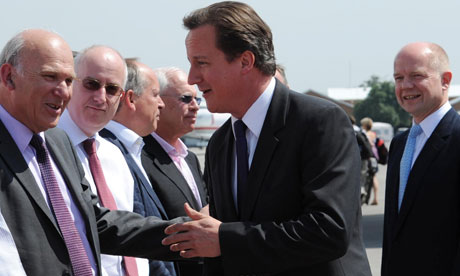Britain is to follow the example of the US and allow the export of civil nuclear technology and expertise to India.
The move, which is the most dramatic illustration of a new special relationship David Cameron is hoping to forge with India, will prove controversial because New Delhi is not a signatory to the nuclear non-proliferation treaty.
Labour backed away from offering co-operation to India on civil nuclear power amid fears that there would be leakage to its military nuclear programme.
Cameron is on a three-day trade mission to India, which starts today. As part of the visit, British Aerospace and Rolls-Royce signed a £700m deal to supply 57 Hawk trainer jets to India.
But the nuclear issue is likely to prove more controversial. The US sanctioned the use of civil nuclear technology to India in 2008 and Britain's business department has lobbied for an equally open approach. The Ministry of Defence and the Foreign Office have been wary of exporting civil nuclear technology to India for fear of upsetting Pakistan and because of fears about links between New Delhi's civil and military nuclear programmes. Online Marketing Services Provider.
Vince Cable, the business secretary who has championed the move, announced the change in Britain's position this morning. "There is already a declaration under which a certain amount of modest research takes place," he said. "We want to take this to a higher level. There are British companies like Rolls-Royce, Serco and others which potentially could do a large amount of business in India.
"There are obvious security sensitivities. We are conscious of those, as are the Indians. But within those constraints we really want to push ahead with civil nuclear co-operation. That would be quite a big sector within which we could really make progress."
The prime minister agreed to the change in Britain's position, which will allow the granting of export licences for civil nuclear expertise and technology, after Cable wrote to the cabinet in June. The prime minister summoned the relevant ministers – Cable, William Hague and Liam Fox – after a recent cabinet meeting to agree the shift in policy.
Government sources said that Hague and Fox had not resisted the move. "The long-term institutional position of the Foreign Office and the Ministry of Defence has been cautious. That has been the institutional position of those departments. You should separate that from the ministerial positions," one source said. Direct Marketing Services Provider.
The sources stressed that export licences would be examined carefully. "We will manage the risks with care," one said.
Britain believes the agreement is compatible with the nuclear non-proliferation treaty, which bans the sale of nuclear technology to nuclear powers that are not signatories. The Nuclear Suppliers Group, of which Britain and the US are members, has granted India a waiver which allows the transfer of technology.
The British Aerospace deal is worth around £700m. Of that, £500m will go BAE Systems and up to £200m to Rolls-Royce. The deal will support more than 200 jobs in the UK. The jets will be built in Bangalore by the BAE subsidiary, Hindustan Aeronautics Limited (HAL).
Cameron said: "This is an outstanding example of India-UK defence and industrial partnership, and this agreement will bring significant economic benefits to both our countries. It is evidence of our new, commercial foreign policy in action." Media Marketing Agency.
The deal follows an agreement in 2004 in which BAE supplied 66 Hawk aircraft to India.






















0 comments:
Post a Comment